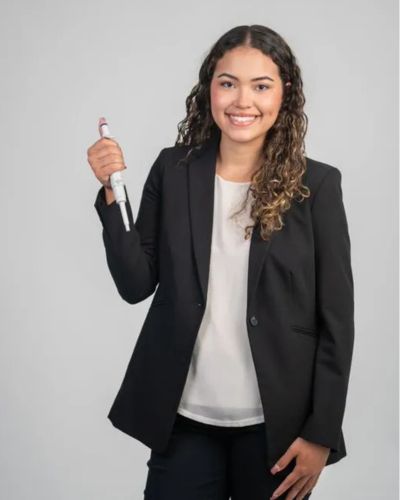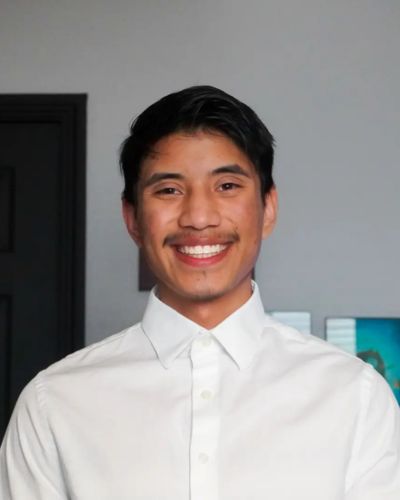Posted on April 25, 2023 by Andrew Chapman

Three UTSA students were recently named Barry Goldwater Scholars. The scholarship is one of the most prestigious national awards for undergraduate students excelling in research in the natural sciences, engineering and mathematics who plan to pursue careers in research.
Marissa Coppin (neuroscience), Ernesto Flores (physics) and Sean McFadden (biology) are among this year’s 413 Goldwater recipients, besting more than 1,200 applicants who were vying for the award.
This year, UTSA had the second highest number of scholars from Texas institutions, trailing only Rice University. Additionally, UTSA was one of only 50 schools nationwide that had three or more scholars named this year.

Coppin is a third-year neuroscience student in the UTSA Top Scholar program. In her first two years, she participated in the Enhancing Science, Technology, Engineering, and Math Educational Diversity (ESTEEMED) program. Under the direction of Program Director Gail Taylor, this National Institutes of Health-funded opportunity provides first and second-year students seeking to develop as scholars with specialized training to prepare them for doctoral studies in STEM fields.
Since her first year at UTSA, Coppin has been conducting research in Jenny Hsieh’s neurogenesis lab to explore treatments for acute and chronic epilepsy. Hsieh, the Semmes Foundation Distinguished Chair in Cell Biology, is the director of the UTSA Brain Health Consortium.
“Being named a Barry Goldwater scholar has been one of the proudest moments of my undergraduate research career,” said Coppin.
Coppin credits the ESTEEMED program for helping her excel in research.
“The journey to this point has been filled with many obstacles, but I have been met with endless support from my lab and research programs at UTSA such as ESTEEMED. I've learned that diversity allows any field to reach new heights, as those with different experiences can contribute to not only the richness of the field but the richness of culture,” she said.
This summer, Coppin will continue working in the Hsieh lab. After graduating from UTSA, the undergraduate plans to pursue a Ph.D. in neuroscience.

Flores is a third-year physics major in the Honors College and MARC (Maximizing Access to Research Careers) program. Like Coppin, he also participated in the ESTEEMED program. He currently works in the Functional Nanomaterials Laboratory under the mentorship of Physics Professor Kelly Nash, whose work focuses on development of nanoparticles and nanoalloy synthesis and the study of their biomedical applications. Flores has spent his summers in research programs hosted by the National Science Foundation at the University of Toledo and the University of Michigan.
Born in the U.S., Flores lived in Mexico until he was 13 years old. Coming to high school in San Antonio, Flores, who was just learning English, was an ESL student who often encountered stereotyping about his background. When he entered UTSA, the ESTEEMED program, it offered him access to scientific research experiences and provided him with an opportunity to develop as a public speaker at academic conferences. As a university professor, Flores plans to help students with similar backgrounds.
“I want to be a professor at a research university to bring my passion for science and physics to my community. As a Latino and first-generation student, I am determined to help students gain access to education and achieve their dreams,” Flores said.” I want to be that mentor that inspires them to pursue research and the career pathways it can offer. From personal experience, I am aware of the lack of outreach to these groups to pursue a degree in science.”
This summer, Flores will participate in a research fellowship at the National Institute of Standards and Technology in Boulder, Colorado. In 2024, Flores plans to pursue a doctorate in physics, conducting research in experimental biophysics so that he can later teach at the university level.

McFadden is a junior biology major. Prior to enrolling at UTSA, he served as a special operations combat medic in the United States Navy. His experience in prehospital care, witnessing and treating a variety of injuries, initially led him toward the path of medical school.
This changed when he transferred to UTSA in 2021 and joined Jing Young Ye’s Biomedical Engineering Laboratory, which conducts research in biomedical optics and nanobiotechnology.
“After years in military, I was not sure how returning to school was going to go. Motivation from my mentors, [UTSA professors] Hector Aguilar and Aaron Cassill, led me to finding research within the biomedical engineering department,” McFadden said. “Working in Dr. Ye’s lab, I was able to gain hands-on experience under the guidance of a doctoral student, Louie Trabucco, and was exposed to cutting-edge research that I may never have found outside of UTSA.”
After being an undergraduate research assistant for almost a year, McFadden now intends to pursue a M.D./Ph.D and become a physician-scientist, where he will develop treatments to improve the longevity and health of the military and veteran communities.
“This experience has not only helped me develop valuable skills and knowledge but has also sparked my passion for advancing medical research,” McFadden said. I feel like I can give back to the military community in a manner that I never would have been able to while serving.”
This summer, McFadden will be participating in the Mayo Clinic Summer Undergraduate Research Fellowship conducting research in regenerative sciences.
Goldwater Scholars can be nominated by UTSA faculty or self-nominees. To be nominated by UTSA, students must be in their second or third year and U.S. citizens or permanent residents. Applications are submitted through the UTSA Office of Nationally Competitive Awards.
Almost all Goldwater applicants plan to pursue a Ph.D. or M.D./Ph.D. and pursue a research career.
This story was originally published on UTSA Today.

